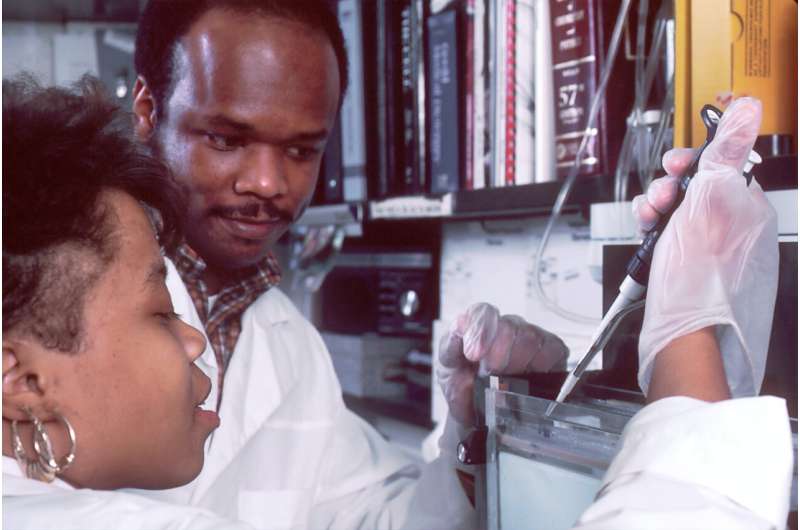Majority of underrepresented early career scientists experience psychological distress; mentoring helps buffer impact
Social unrest due to systemic racism is causing early career scientists from underrepresented backgrounds to experience psychological distress, according to new results from a research survey conducted by University of Pittsburgh scientists. Such distress is a red flag as academic institutions nationwide strive to improve diversity.
But less than a third said social unrest negatively impacted their ability to work, and survey participants were more than twice as likely to say their mentoring relationships were positively, rather than negatively, impacted.
“Responses to open-ended survey questions made it seem like maybe people had positive feelings about mentoring because they were starting to talk about the racial justice movement and get affirmation of their feelings from their mentors,” said Dr. Gretchen White, assistant professor in Pitt’s School of Medicine and lead author of the study, published in the Journal of Clinical and Translational Science.
White noted that previous studies have shown the importance of mentorship, when a more experienced person provides guidance and support to someone less experienced, particularly in the workplace.
“Our findings reinforce the positive impact of mentoring,” she said. “But mentoring isn’t the only answer. I’d be remiss not to emphasize the incredibly detrimental effects of psychological distress. People may have found ways to deal with this stress at work, but we know that early career scientists from underrepresented backgrounds disproportionately leave their careers.”
The survey was conducted as part of the Building Up a Diverse Biomedical Research Workforce (Building Up) Trial, which is testing approaches—such as mentoring and networking—to improve retention of early career researchers who are underrepresented in the health sciences, including people who identify as Black, Hispanic or female, have disabilities or are from disadvantaged backgrounds.
A total of 144 early career researchers from 25 academic institutions participated in the survey; 80% were female, 35% were Black and 40% Hispanic.
Following the survey, the researchers interviewed some participants to better understand the results.
“Many participants described work environments riddled with overt discrimination and isolation from other persons of color,” said White. “I love science and research, but conducting it in a work environment that is not supportive and sometimes hostile is upsetting and stressful. Being inclusive and having diverse researchers, like myself and others, makes for better science and discovery to benefit society as a whole.”
Study: Peer mentorship is key to achieving equity in higher education leadership
Gretchen E White et al, The Impact of Social Unrest due to Systemic Racism on Underrepresented Post-doctoral Fellows and Early-Career Faculty, Journal of Clinical and Translational Science (2022). DOI: 10.1017/cts.2022.445
Citation:
Majority of underrepresented early career scientists experience psychological distress; mentoring helps buffer impact (2022, September 5)
retrieved 5 September 2022
from https://phys.org/news/2022-09-majority-underrepresented-early-career-scientists.html
This document is subject to copyright. Apart from any fair dealing for the purpose of private study or research, no
part may be reproduced without the written permission. The content is provided for information purposes only.

Social unrest due to systemic racism is causing early career scientists from underrepresented backgrounds to experience psychological distress, according to new results from a research survey conducted by University of Pittsburgh scientists. Such distress is a red flag as academic institutions nationwide strive to improve diversity.
But less than a third said social unrest negatively impacted their ability to work, and survey participants were more than twice as likely to say their mentoring relationships were positively, rather than negatively, impacted.
“Responses to open-ended survey questions made it seem like maybe people had positive feelings about mentoring because they were starting to talk about the racial justice movement and get affirmation of their feelings from their mentors,” said Dr. Gretchen White, assistant professor in Pitt’s School of Medicine and lead author of the study, published in the Journal of Clinical and Translational Science.
White noted that previous studies have shown the importance of mentorship, when a more experienced person provides guidance and support to someone less experienced, particularly in the workplace.
“Our findings reinforce the positive impact of mentoring,” she said. “But mentoring isn’t the only answer. I’d be remiss not to emphasize the incredibly detrimental effects of psychological distress. People may have found ways to deal with this stress at work, but we know that early career scientists from underrepresented backgrounds disproportionately leave their careers.”
The survey was conducted as part of the Building Up a Diverse Biomedical Research Workforce (Building Up) Trial, which is testing approaches—such as mentoring and networking—to improve retention of early career researchers who are underrepresented in the health sciences, including people who identify as Black, Hispanic or female, have disabilities or are from disadvantaged backgrounds.
A total of 144 early career researchers from 25 academic institutions participated in the survey; 80% were female, 35% were Black and 40% Hispanic.
Following the survey, the researchers interviewed some participants to better understand the results.
“Many participants described work environments riddled with overt discrimination and isolation from other persons of color,” said White. “I love science and research, but conducting it in a work environment that is not supportive and sometimes hostile is upsetting and stressful. Being inclusive and having diverse researchers, like myself and others, makes for better science and discovery to benefit society as a whole.”
Study: Peer mentorship is key to achieving equity in higher education leadership
Gretchen E White et al, The Impact of Social Unrest due to Systemic Racism on Underrepresented Post-doctoral Fellows and Early-Career Faculty, Journal of Clinical and Translational Science (2022). DOI: 10.1017/cts.2022.445
Citation:
Majority of underrepresented early career scientists experience psychological distress; mentoring helps buffer impact (2022, September 5)
retrieved 5 September 2022
from https://phys.org/news/2022-09-majority-underrepresented-early-career-scientists.html
This document is subject to copyright. Apart from any fair dealing for the purpose of private study or research, no
part may be reproduced without the written permission. The content is provided for information purposes only.
